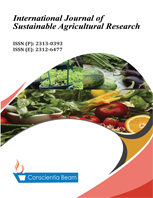Analysis of Fresh Fish Marketing in Ngaski Local Government Area of Kebbi State, Nigeria
DOI:
https://doi.org/10.18488/journal.70/2015.2.1/70.1.22.30Abstract
The study examined the marketing of fresh fish in Ngaski Local Government Area of Kebbi State, Nigeria. With the aid of a sampling frame, proportionate random sampling technique was used to select fish marketers. Thus, a total of one hundred and ten (110) fish marketers constitute the sample size for the study. Structured questionnaire was used to collect data for the respondents. Data analysis was carried out using descriptive statistics, marketing efficiency, marketing margin and T-test statistics. Result of the study revealed that about 26% of fresh fish marketers in the study area were within the age range of 20 to 30 years, fresh fish marketing in the study area is dominated by males (71.9%). Furthermore, about 83% of fresh fish marketers in the study area were married; majority (85.4%) of fresh fish marketers in the study area were literate. About 72% of fresh fish marketers in the study area had their monthly income ranging from N2, 000 to N20, 000. Also revealed from the result, 38.1% of fresh fish marketers in the study area had fresh fish marketing experience of 6 to 10 years. Result further showed that marketing margin of an average fresh fish marketer was N190 and the percentage marketing margin was 30%. The marketing efficiency of fresh fish in the study area was 0.582 and percentage marketing efficiency was 58%. Majority (63.64%) of fresh fish marketers buy fish directly from the fishermen and retailed it to consumers. On the problems faced by fresh fish marketers in the study area, 58.2% reported that fish spoilage was the major problem of fresh fish marketing. There was significant difference between the retail price and the river bank price of fresh fish in the study area. It could be concluded that fresh fish marketing in the study area was profitable and that fresh fish marketing in the study area was inefficient. It is therefore recommended that research institute such as national centre for agricultural mechanization should develop simple, affordable and easily adoptable equipment for fresh fish storage and preservation to avoid spoilage and loss.

